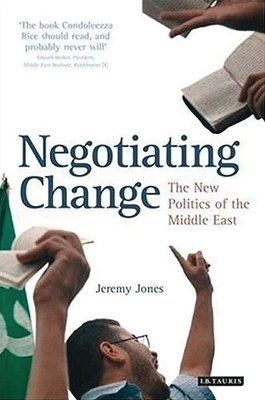Library of Modern Middle East Studies
1 total work
v. 58
The Middle East is frequently portrayed as a collection of stubbornly authoritarian states, whose behaviour can only be changed by the table-thumping or even the military intervention of the US government. But as Jeremy Jones uncovers in this fascinating book, the region is in fact engaged in a profound and tumultuous process of political change. The movements seeking democracy and reform that have emerged are rooted in local cultures and political traditions. And because of this, they are overlooked, obstructed, or even undermined by the US's pursuit of a one-size fits all Western democratic model.
A veteran Harvard Middle East analyst, Jeremy Jones travels from Morocco to Oman, from Egypt to Iran listening to grassroots activists, and interviewing major political leaders, such as Turkish Prime Minister Erdogan. He provides a vivid picture of the changing political cultures of the Middle East. He looks at new forms of political Islam, from Hamas in the West Bank to the Justice and Development Party in Turkey to Hizballah in Lebanon, demonstrating how each movement grew out of its local context. He meets women politicians in the Gulf, Hamas leaders in Ramallah and democracy activists in Jordan and Syria, seeking to understand how these new forces relate to each other, to their societies, and to Western policies. In a trenchant critique of the much-vaunted US 'democratisation agenda', Jones concludes that a participatory and accountable political culture is slowly emerging in spite, not because of Western foreign policies.
A veteran Harvard Middle East analyst, Jeremy Jones travels from Morocco to Oman, from Egypt to Iran listening to grassroots activists, and interviewing major political leaders, such as Turkish Prime Minister Erdogan. He provides a vivid picture of the changing political cultures of the Middle East. He looks at new forms of political Islam, from Hamas in the West Bank to the Justice and Development Party in Turkey to Hizballah in Lebanon, demonstrating how each movement grew out of its local context. He meets women politicians in the Gulf, Hamas leaders in Ramallah and democracy activists in Jordan and Syria, seeking to understand how these new forces relate to each other, to their societies, and to Western policies. In a trenchant critique of the much-vaunted US 'democratisation agenda', Jones concludes that a participatory and accountable political culture is slowly emerging in spite, not because of Western foreign policies.
